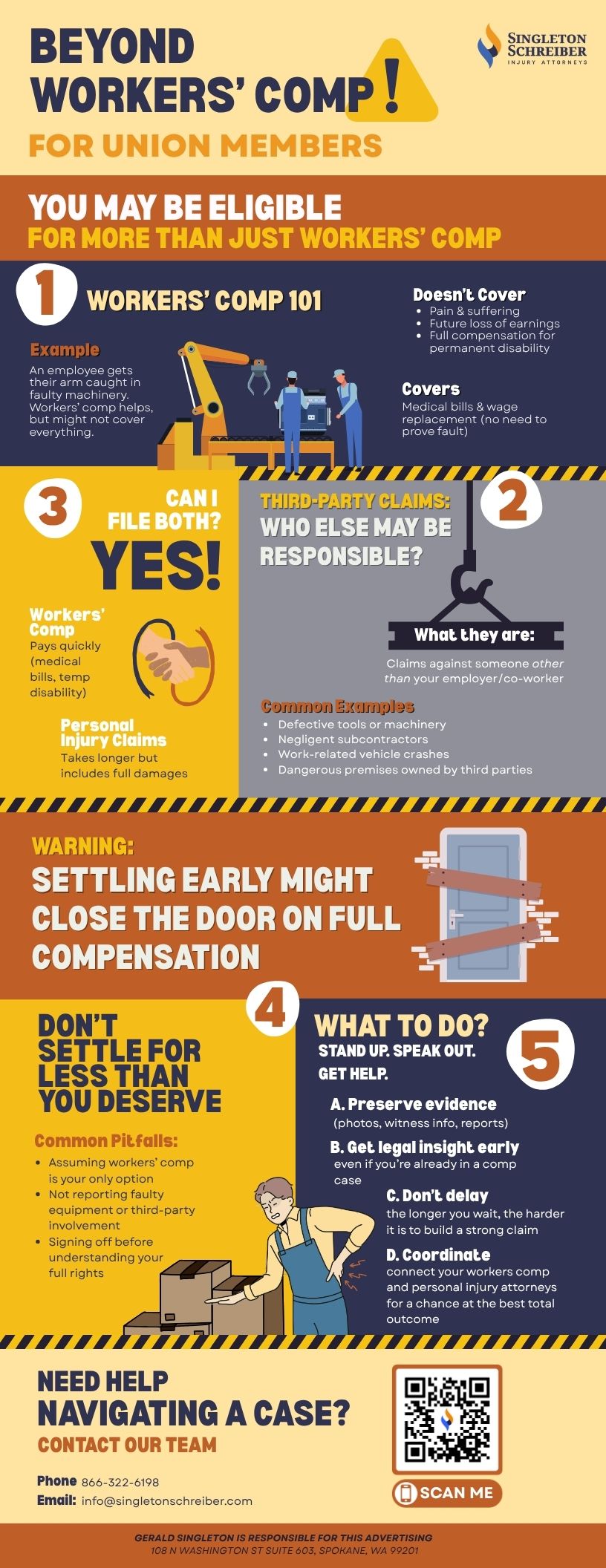
Speaking up about serious workplace issues, such as safety violations, fraud, or harassment, takes courage, especially in a unionized environment where workplace issues are addressed through established procedures. If you’ve witnessed illegal or unethical behavior and are considering reporting it, it’s crucial to understand your rights as a whistleblower and the protections available to you.
If you’re facing retaliation or wondering whether your concerns qualify for whistleblower protection, contact Singleton Schreiber today to speak with one of our knowledgeable attorneys to help you protect your rights.
What Is a Whistleblower?
A whistleblower is an individual (often, but not always, an employee or contractor) who reports illegal, unethical, fraudulent, or unsafe conduct occurring within their workplace. This can include violations of the law, worker or public safety concerns, misuse of funds, or gross mismanagement issues that may fall outside the scope of traditional workplace complaints or union grievance procedures.
While many workplace issues can be effectively addressed through a union’s grievance process, whistleblowing involves reporting serious misconduct, such as legal violations or threats to public or worker safety that may require legal protection and support.
Examples of whistleblowing in union settings include:
- Reporting unsafe working conditions that put employees at risk, such as malfunctioning equipment or a lack of proper safety equipment or training
- Exposing fraud or theft involving union funds or employer misappropriation of public money
- Reporting environmental violations, like illegal dumping or pollution by the employer, or submittal of inaccurate or false reports or monitoring data
- A company’s failure to report (or false reporting) of incidents, or failure to address known issues that impact the company’s legal obligations or worker or public safety
- Reporting workplace harassment or discrimination that violates federal or state civil rights laws
Uncovering organizational corruption within employer or the union, or other companies or organizations, such as bribes, kickbacks, conflicts of interest, or inappropriate financial arrangements
Understanding the difference between a labor complaint and whistleblowing is key to knowing your rights and protecting yourself.
Federal and State Protections That Apply to Union Members
Union membership does not limit your right to speak out against illegal or dangerous practices in the workplace. There are several federal and state laws that offer strong protections to whistleblowers, including unionized employees, who report misconduct. These laws safeguard workers from retaliation and provide channels for holding employers accountable. In general, these protections also ensure that the identity of whistleblowers is kept confidential while the government investigates the allegations.
Key protections include:
- Labor-Management Reporting and Disclosure Act (LMRDA): he LMRDA includes protections against retaliation, prohibiting employers or labor organizations from taking action against employees who report financial irregularities or other violations of the Act to authorities. The Whistleblower Protection Act (WPA): Protects federal employees who disclose information about illegal activity, gross mismanagement, abuse of authority, or threats to public safety.
- False Claims Act: The federal False Claims Act protects individuals who provide information concerning possible fraud by government contractors, health care companies, and other recipients of federal funding. The False Claims Act is a broad law with powerful enforcement mechanisms that reaches nearly every type of federal funding and provides generous financial rewards to whistleblowers for successful outcomes.
- Occupational Safety and Health Administration (OSHA): Enforces whistleblower protections under more than 20 federal statutes, safeguarding workers who report safety hazards, workplace injuries, and violations of environmental or transportation laws.
- The Sarbanes-Oxley Act (SOX) & Dodd-Frank Act: Protect employees of publicly traded companies who report corporate fraud, accounting misstatements, or violations of securities law, offering protection from retaliation and potential financial rewards.
- Washington State-specific protections:
- Washington State Public Policy Exception: Protects workers, union or not, who are fired for reporting illegal conduct that threatens public safety or violates public policy
- Washington State False Claims Act (Medicaid Fraud): Allows individuals to report fraud involving state Medicaid funds, with protections against retaliation.
- National Labor Relations Act (NLRA) Section 7: protects employees’ rights to engage in “concerted activity” for mutual aid or protection, including collectively speaking out about unsafe working conditions or employer misconduct.
Union Protections vs. Legal Protections
Unionized workers often have access to grievance procedures and protections laid out in their collective bargaining agreements. These internal processes are designed to resolve disputes between employees and management through structured, negotiated channels. These procedures are helpful in many situations, but union procedures are not a substitute for the legal protections provided under whistleblower laws.
Pursuing an internal union grievance may be appropriate, particularly when the issue involves contract violations or disciplinary actions. However, when a worker uncovers illegal activity, such as fraud, health and safety violations, or discrimination, external reporting may be necessary to trigger the legal protections of federal or state whistleblower laws. Some whistleblower protections require timely reporting to government agencies and do not depend on union involvement.
Understanding the difference between your union rights and legal protections as a whistleblower is critical. In some cases, it may be possible, and wise, to pursue both internal and external remedies simultaneously. An experienced whistleblower attorney can help you determine which path to take and how to navigate the process and ensure your rights are upheld.
Recognizing Retaliation
Retaliation can take many forms, and it does not always happen immediately or overtly. Some of the most common examples of retaliation include:
- Being fired or demoted shortly after making a report
- Sudden reassignment to less desirable shifts or duties
- Blacklisting or being denied future job opportunities
- Exclusion from meetings or training opportunities
- Facing verbal abuse, intimidation, or harassment by supervisors or coworkers
According to a 2019 study, researchers found that nearly two-thirds of whistleblowers experienced some form of retaliation after engaging in protected activity. The study found that:
- 69% were either forced to retire or lost their job
- 64% were given negative employment performance evaluations
- 68% were more closely monitored by supervisors
- 69% were criticized or ostracized by coworkers
- 64% were blacklisted from other jobs in their field
Another study, conducted in 2022 by the National Employment Law Project (NELP) found that the majority of workers who reported violations, either to their employer or a government agency, experienced some type of employer retaliation.
These actions are illegal when they occur as a direct response to protected whistleblowing activity. That’s why it’s essential to document every detail, such as dates, conversations, emails, performance reviews, and more. It is best to begin documenting everything the moment you begin to consider speaking out. The timing of retaliatory actions is often a key factor in proving your case.
If you believe you’re being punished for reporting wrongdoing, don’t wait to get legal help and file a claim. Obtaining early legal guidance can help you preserve your rights and get justice.

How to Protect Yourself while Blowing the Whistle
Speaking up about wrongdoing in the workplace can carry risks, but there are smart steps you can take to protect yourself from retaliation and preserve your rights.
- Know where to report: Identify the appropriate channels, whether it’s your union representative, a government agency, or legal counsel.
- Document everything: Keep detailed records of the misconduct and any interactions related to your report
- Understand your rights: Familiarize yourself with both union and legal protections available to you, and involve your union representative when appropriate and necessary
- Seek legal advice: Consult with an attorney who has experience in whistleblower cases to guide you through the process.
Resources and Next Steps
Navigating whistleblower protections as a union member can be complex, but you don’t have to do it alone. Whether you’ve already reported misconduct or are weighing your options, knowing where you stand legally can make all the difference.
If you believe you’re experiencing retaliation or simply want clarity on your rights, contact Singleton Schreiber. Our experienced attorneys are here to support you and ensure you are protected.
- Partner
Dan Fruchter is a partner at Singleton Schreiber’s Spokane office, focused on consumer and financial fraud, environmental protection, personal injury, fire litigation, public entity, and civil rights law. Mr. Fruchter brings ...
- Partner
Vanessa Waldref, former U.S. Attorney for the Eastern District of Washington, is a partner and founding member of Singleton Schreiber’s Washington office, focusing on environmental protection, wildfire litigation, public ...


